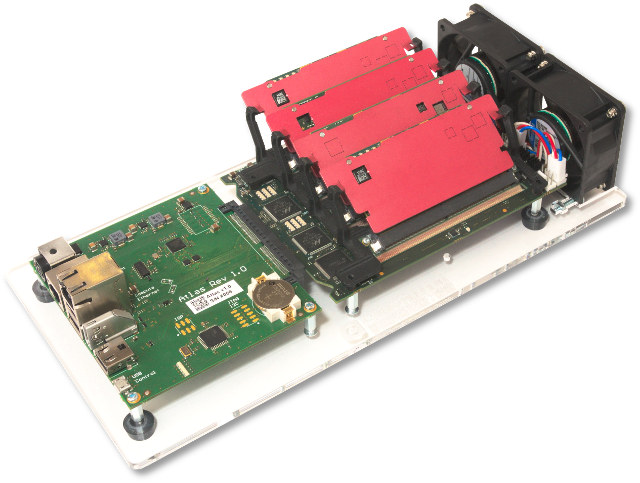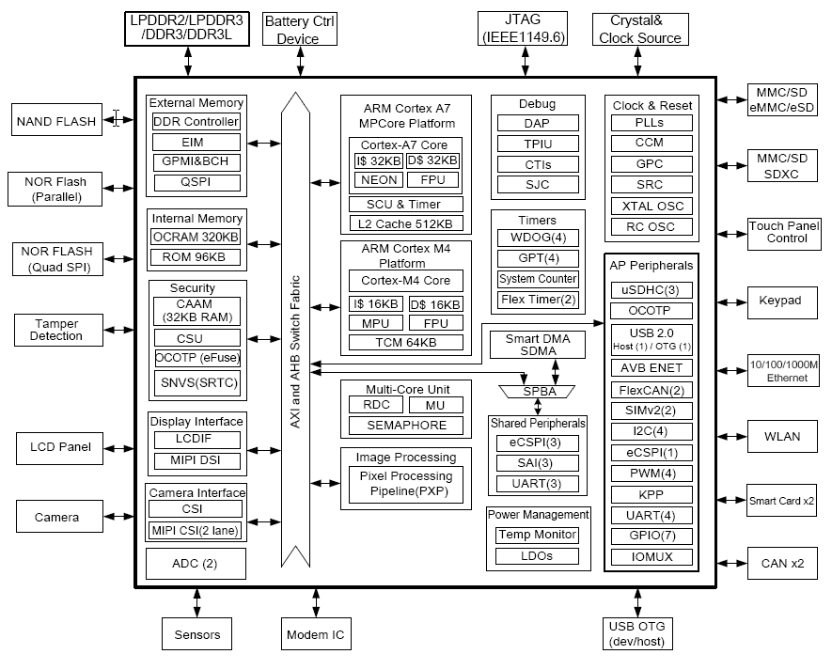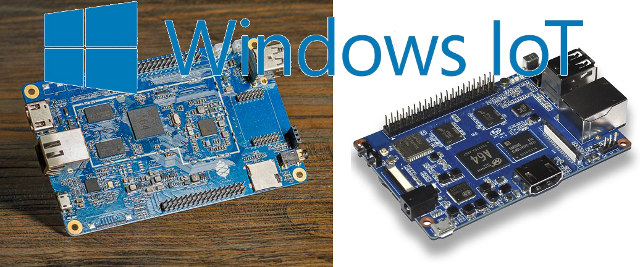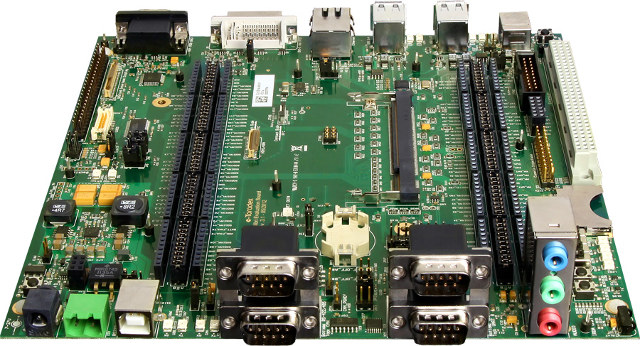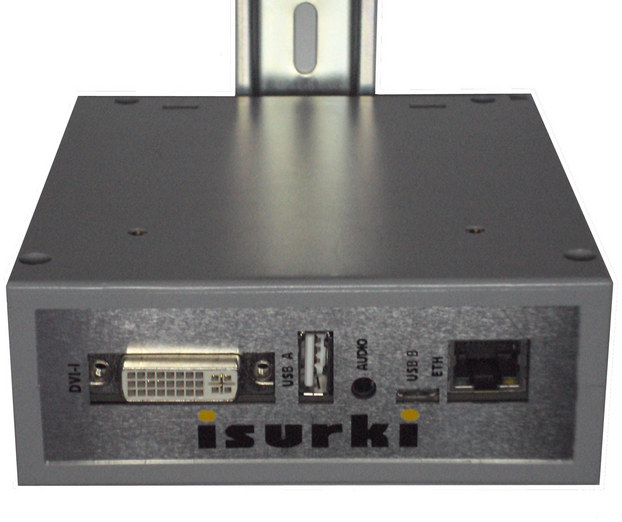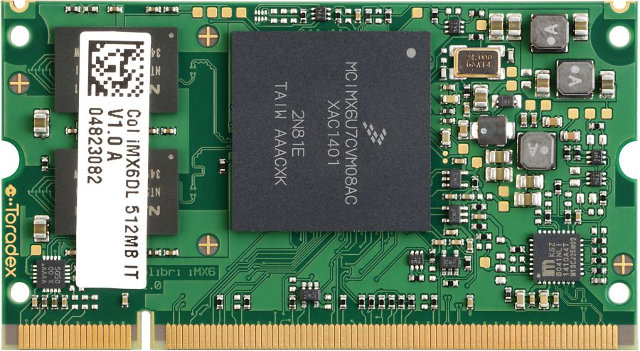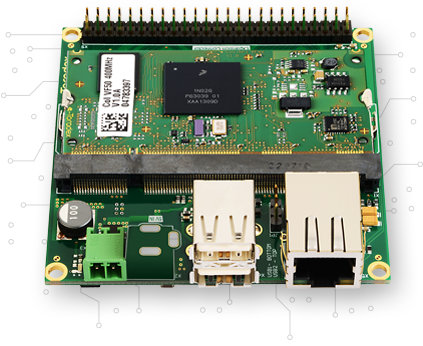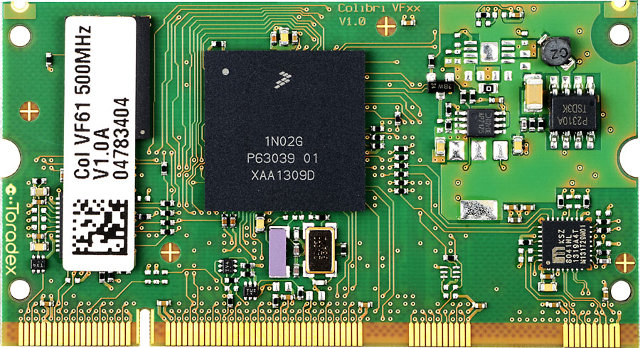System-on-modules are normally used in low volume embedded systems, but they can also be used in microservers, for example to upgrade capacity as needed. Christmann informationstechnik + medien GmbH has developed a microserver evaluation kit taking up to 4 Toradex Apalis SoMs for example based on Nvidia Tegra K1 processor, and also offers full rack systems with up to 72 modules. Christmann RECS|Box Atlas Quad Apalis specifications: Modules – 4x Slots for Apalis SoM Connectivity – 1 GBit/s Compute Ethernet, 1 GBit/s Management Ethernet Video Output – 1x HDMI USB – 3x USB host ports, 1x micro USB port Misc – 5 Status LEDs for USB, communication, and serial console, 4x fan connectors, KWM switch, 5x temperature sensors, 6x current sensors, 1x voltage monitor, fan speed monitoring Power Supply – 12V via a 4-pin jack Dimensions – 300 x 145 x 68 mm The evaluation kit includes an Atlas board […]
HMP, Real-Time Linux and Xenomai – A Look at Three Options to Develop Real-Time Linux Systems on Application Processors
This is a guest post about Heterogeneous Multicore Processing (HMP), Real-Time Linux, and Xenomai to develop real-time Linux systems written by Guilherme Fernandes, Raul Muñoz, Leonardo Veiga, Brandon Shibley, all working for Toradex. Introduction Application processor usage continues to broaden. System-on-Chips, usually powered by ARM Cortex-A cores, are taking over several spaces where small ARM Cortex-M, and other microcontroller devices, have traditionally dominated. This trend is driven by several facts, such as: The strong requirements for connectivity, often related to IoT and not only from a hardware point of view but also related to software, protocols, and security The need for highly interactive interfaces such as multi-touch, high-resolution screens, and elaborate graphical user interfaces; The decreasing price of SoCs, a consequence of its volume gain and new production capabilities. Typical cases exemplifying the statement above are the customers we see every day starting a product redesign upgrading from a microcontroller […]
Allwinner A64 based Pine A64 and Banana Pi M64 Boards Can Now Run Windows 10 IoT Core
Windows IoT is a version of Windows 10 that’s optimized for smaller devices with or without a display, and was fist released for Raspberry Pi 2 and MinnowBoard MAX. Since then a few more boards are now officially supported, including DragonBoard 410c, and Raspberry Pi 3. But there’s been some recent developments as two Allwinner A64 64-bit ARM boards are now supported according to two wiki entries (here and there) explaining how to run a simple Csharp sample on Windows 10 IoT Core on either Banana Pi M64 or Pine A64 boards. The guide shows how to configure Azure IoT Hub, register the IoT device, and build and deploy Azure IoT SDK on the board. But basically if all you want to is to run Windows IoT core on either board, you’ll need to download either: Windows 10 IoT Core for Banana Pi M64: Windows10IoT_BPI-M64.ffu (Link removed as Microsoft does […]
Setting a VoIP SIP user agent with Embedded Linux
This is a guest post by Leonardo Graboski Veiga, working for Toradex. Introduction This article’s main goals are: to cross-compile the PJSIP libraries and the PJSUA API reference implementation; deploy it to the target system; give an overview about the SIP protocol; and explore the reference implementation features, regarding audio only. For this purpose, a Computer on Module (CoM) from Toradex was chosen in the following configuration: Colibri iMX6DL* + Colibri Evaluation Board. The evaluation board and CoM are displayed in Figures 1 and 2, respectively. VOIP or Voice over IP, is a term designed to refer to a set of methods and technologies targeted for the implementation of telephony services over the Internet. For the purpose of this article, the scope will be limited to the use of a reference implementation built upon the SIP communication handling protocol by means of the PJSIP libraries and PJSUA2 API. If […]
Isurki IRIS Industrial Embedded Computer Takes Nvidia or NXP System-on-Modules
Isurki is a Spanish company providing electronics & IT services to hydraulic resources management companies, and one of their products is IRIS industrial embedded computer based on Toradex Iris carrier board that supports Toradex Colibri ARM system-on-modules based on either Nvidia Tegra 2/3 or NXP Vybrid VF50/VF61 processors. Main board connectors and features: Video – DVI-I LCD Interface – RGB / LVDS with 4/5 resistive touch interface Audio – Line-In, line-Out, Mic-In Storage – Micro SD Connectivity – 10/100M Ethernet USB – 1x USB host, 1x USB OTG Expansion – 24 GPIOs, 3x UART ports Misc – 1x IrDA, RTC Power Supply – 6 to 27V DC, reverse polarity and short circuit protected Then you can choose among several variations of ARM based Colibri system-on-modules: Colibri T20 Nvidia Tegra 2 dual core Cortex A9 processor with 256 to 512MB DDR3, and 512MB to 1GB flash Dual independent displays 2D/3D hardware […]
Toradex Colibri i.MX6 SoM with Freescale i.MX6 Solo and DualLite Processors
Toradex has added a new system-on-module to its Colibri family with Colibri IMX6 SoM powered by either Freescale i.MX 6Solo singl core processor, or i.MX 6DualLite dual core core processor. The SoMs are available in both both commercial and industrial temperature grade, come with up 4GB eMMC, 256 to 512MB RAM, and support Linux or Windows Embedded operating systems. Specifications listed for the Toradex Colibri i.MX6 module include: SoC – Freescale i.MX6 Solo single core or DualLite dual core Cortex-A9 core @ 800MHz (Industrial temp.) or 1GHz (Commercial temp) with Vivante 2D/3D GPUs. System Memory – 256MB (Solo) or 512MB (DualLite) DDR3 Storage – 4GB eMMC flash I/Os available via the 200-pin SO-DIMM connector: 3x 8-bit SDIO/SD/MMC 10/100M Ethernet (Micrel KSZ8041NL PHY) USB 2.0 host, USB 2.0 OTG Video Output HDMI 1.4a up to 1080p resolution RGB up to 1920×1200 (24bpp) Camera – 2x Camera Parallel inputs Audio – Audio line-in […]
Toradex Customized Single Board Computers Powered by Freescale Vybrid and i.MX6 Sell for 39 Euros and Up
Toradex has launched what they call “Customized SBCs” (Single Board Computers) comprised of the usual carrier board an computer-on-module (CoM) combination, using their Apalis & Colibri families. The company offers various combination of Freescale i.MX6 and Vybrid VF50 single board computers, with price starting at 39 Euros for 1k order, or 49 Euros for samples. I’ve already featured Toradex Colibri VF50 (and VF61) modules in another post, but to summarize Colibri VF50 is a computer modules based on Freescale Vybrid VF50 ARM Cortex A5 CPU with 64 to 128MB DDR3, and 128MB NAND flash that targets industrial applications requiring long term availability (15 years). VF50 sells as low as 19 Euros per unit for 10k orders. Viola is a new open source hardware carrier board with the following features: Compatible with all Toradex Colibri CoMs External Storage – microSD interface Video – RGB LCD Interface, 4 wire resistive touch interface […]
Toradex Colibri VF50/VF61 SoMs Powered by Freescale Vybrid SoCs Sell for as Low as 19 Euros
Toradex Colibri VF50 and Colibri VF61 are system-on-modules respectively powered by Freescale Vyrbrid VF5xx Cortex A5 SoC and Vybrid VF6xx dual core Cortex A5/M4 SoC, which are part of the company’s Colibri ARM computer on modules. Toradex Colibri VF50/VF61 specifications: Processor VF50 – Freescale Vybrid VF5xx (MVF50NN151CMK40) ARM Cortex-A5 @ 400MH, 1.5MB SRAM VF61 – Freescale Vybrid VF6xx (MVF61NS151CMK50) ARM Cortex-A5 @ 500MHz, Cortex-M4 @ 167MHz, 1.0MB SRAM, and multiple hardware accelerated security features listed below. System Memory VF50 – 128MB DDR3 (16-bit, no ECC), or 64MB DDR3 with ECC (8-bit, ECC) VF61 – 256MB DDR3 (16-bit, no ECC), or 128MB DDR3 (8-bit, ECC) Storage VF50 – 128MB NAND flash VF61 – 1GB NAND flash Interfaces via the 200-pin SO-DIMM edge connector (X1): LCD RGB (24-bit), up to 1024 x 768 4-wire or 5-wire resistive touch Audio – I/O (VF61 only), SPDIF In and Out, I2S/AC97 compatibl Ehanced Serial Audio […]


